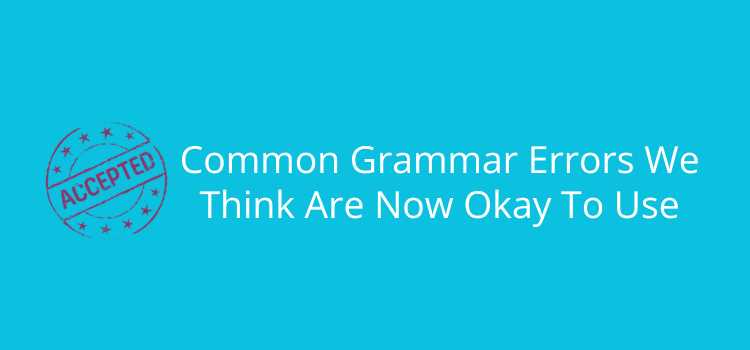
Every writer can make common grammar errors, but some are so normal now that we’ve started to think they’re okay.
It could be ending a sentence with a preposition or using “less” when “fewer” would usually be correct.
These little slip-ups have a name. Solecism means a mistake in grammar, syntax, or word choice that is irregular or incorrect. Over time, solecisms slowly enter our everyday speech and writing and become acceptable, even though they break strict grammar rules.
Understanding how and why this happens can help writers choose when to follow the rules or when bending or breaking them can work.
How common grammar errors become accepted solecisms
Language changes constantly, affecting how we speak and write.
A good example is how we use the adverb literally now for emphasis, even when nothing is literal or factual.
But it’s not only vocabulary that develops and changes.
Grammar is changing too, as what were once considered grammar errors have morphed into acceptable usage.
While these changes might annoy grammar purists (like me), frequent use in the media, literature, and online helps turn these into accepted forms.
Two standout examples came from a television series and, surprisingly, supermarkets.
You can blame Captain Kirk from Star Trek for reducing the split infinitive rule to rubble when he decided to boldly go where no man has gone before.
And supermarkets? Long before self-scanning, supermarkets around the world had express checkouts for “8 items or less.”
Of course, these checkout lanes should have catered to “8 items or fewer,” but the mistake stuck fast.
From these quick examples, it’s easy to see how grammar can change and why some solecisms, or common grammar errors, become the new normal.
10 Grammar mistakes we often choose to ignore
You can find many grammar rules that are flexible, especially in everyday speaking. But writers often break them deliberately for style, tone, or voice.
Using these choices can help make writing feel more natural, conversational, or expressive.
Here are ten common grammar mistakes that rarely cause any reason to complain for both writers and readers.
1. Ending sentences with prepositions
Churchill famously stated that this was a rule “up with which he could not put.”
So, it’s not a new writing fashion by any means. If it feels and reads naturally, there’s no reason to always follow this rule.
2. Using “less” instead of “fewer”
It was okay for supermarkets for many years, so it’s now okay for you.
If less people bought your new book than you had hoped for, I’m sorry. Not in terms of my grammar, but for your bank balance.
3. Singular “they”
Once considered incorrect, if not impossible to use, they, as a gender-neutral singular pronoun, is now very common in all forms of writing.
4. Starting sentences with conjunctions
While this has never been a strict grammar rule to break, it has always been a stylistic one.
Using “and”, “but”, or “so” to start a sentence can add emphasis or conversational tone.
I doubt there are any writers who see a problem with this.
5. Splitting infinitives
If you want to quickly prepare or to slowly write, go ahead.
No one will complain or even notice when you decide to boldly split the infinitive.
6. Who instead of whom
Whom has almost disappeared from modern English. So, unless you have a specific need, stick with who in most situations.
With whom did you go to the concert? It simply doesn’t work any longer.
7. Double negatives
In casual or fiction writing, phrases like “I don’t need no one to help me” can work effectively in dialogue or informal uses.
However, in some contexts, double negatives create a positive meaning: “I can’t not help you”, or “It’s not uncommon to see this.”
8. Sentence fragments
Fragments are not fully formed sentences because they lack a subject or a verb.
However, expressions like “No way,” or “Not again,” are not only useful, but very common now in all types of writing.
9. You and I and you and me
While “just between you and I” is grammatically incorrect, it’s so common now that few people notice.
Another example is “She’s a better writer than me.” It should be “than I am”, but only a grammar stickler would argue the point.
10. Misplaced modifiers
It’s a rule, and a good one to follow. However, it’s not as strict as it once was.
You might find this example acceptable because it’s understandable in context. “I was going to work and noticed a cream woman’s handbag on the bus.”
But it does leave the question as to whether the woman or the handbag was cream.
When to break, bend, or follow the rules
In all forms of communication and writing, efficiency often trumps formality today.
Yes, grammar rules help us with structure, but they are not always the best guide for modern writing.
You can always break or bend a rule to suit your writing voice, add humor or irony, or for emphasis.
When you know the rules, it’s much easier to break or bend them, because you know what you are doing.
However, always be aware of your purpose. In formal, business, or academic writing, precision and formality still count.
But for casual, creative, or fiction writing, you have a lot more freedom to express yourself.
Conclusion
Grammar rules might be your guide, but language is changing almost every day.
It means that you have more freedom to navigate some common writing mistakes that have now become acceptable.
But you still need to pick and choose when to adopt a more modern structure. That will always depend on your skill and knowledge as a writer.
The best rule to follow is intention. What do you want to say, and how do you want to say it?
Yes, you have more grammatical flexibility now, but you still need to be aware and stay within acceptable boundaries.
But you can still have fun bending the rules to suit your writing voice and style.
Related Reading: 15 Ways To Use Adverbs Effectively In Your Writing
Share This Article


